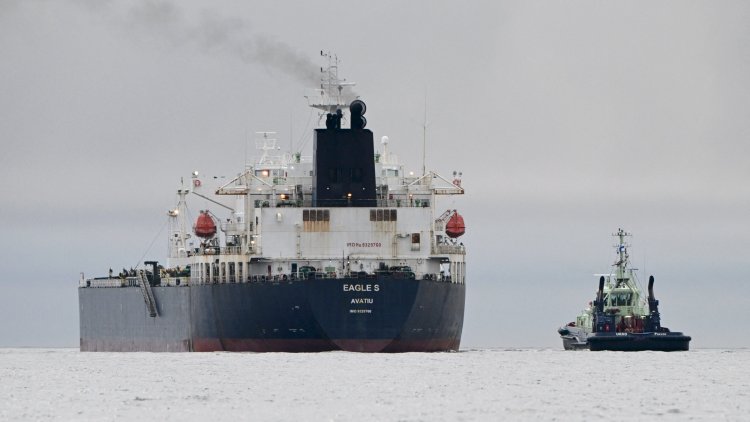A Wider War Has Already Started in Europe
Putin’s not-so-quiet sabotage campaign against European democracies

For the past three years, Russia has used missiles and drones to locate and destroy vital infrastructure in Ukraine—power plants, dams, electrical-transmission lines. Everyone understands that these attacks are acts of war, no matter how steadfastly President Vladimir Putin describes them as part of a “special military operation.” When Russia targets other European neighbors, though, the West resorts to its own euphemisms to avoid directly acknowledging what Putin is doing.
Last month, the undersea power cable Estlink 2, which connects Estonia with fellow European Union and NATO member Finland, was suddenly cut. The EU’s top foreign-policy official described the incident somewhat dryly and without explicitly blaming Russian agents: It was, she said, merely “part of a pattern of deliberate and coordinated actions to damage our digital and energy infrastructure.” Obviously, cutting a power line is a less overt form of aggression than the full-scale invasion that Putin launched in Ukraine. The common thread, though, is that Russia is using force to undermine a recognized country’s independence and its ability to fight back.
Undersea cables have been vital to the sovereignty of Estonia, a former Soviet republic that borders Russia and desperately needs to maintain power and communications channels that are free from Moscow’s control. Soon after Estlink 2 was sabotaged, Finnish authorities seized the oil tanker Eagle S, which was en route from St. Petersburg, Russia, to Egypt. Registered in the Cook Islands in the Pacific Ocean, the ship is likely part of Russia’s so-called shadow fleet—a collection of foreign-flagged tankers that Putin’s regime uses to sell Russian oil and skirt international economic sanctions imposed after his invasion of Ukraine.
The Eagle S, however, apparently had a covert military purpose as well: Investigators discovered that the vessel was crammed full of advanced surveillance equipment, which used so much power that the ship suffered from periodic blackouts. Finnish authorities concluded that the Eagle S had dragged its anchor across the Baltic Sea bed for “dozens of kilometers” in an attempt to break the Estlink 2 line.
Still, in this and other cases across the continent, European officials seem terrified of admitting what is happening. Authorities in multiple countries are investigating parcels that spontaneously caught fire or exploded in the custody of cargo airlines, perhaps in preparation for a broader operation that would threaten many large aircraft. Saboteurs have targeted a number of other strategically significant assets in Europe—munitions factories, crucial rail lines—along with civilian infrastructure such as warehouses and malls.
Investigators believe that Russia is behind the attacks. In December, the EU imposed sanctions on certain Russian individuals and entities in response to recent sabotage. Still, the official announcement declined to use the word war to characterize Moscow’s activities outside Ukraine. Instead, the EU condemned Russians’ “destabilising” and “malicious actions.”
The inability to describe acts of war as acts of war is part of a culture of distortion and denial regarding the subject of state-sponsored violence. Over generations, policy makers have created many subclasses of conflict: cold wars, police actions, hybrid wars, cyber wars. Different euphemisms serve different purposes. Putin prefers special military operation because he doesn’t want to publicly admit that he is waging a brutal war on Ukrainians. Many in Europe avoid describing Russia’s sabotage campaign outside Ukraine as war because they’d rather not have to do anything in response.
European officials would be better off honestly admitting the reality of what they are confronting. Putin’s invasion of Ukraine is only the most conspicuous part of what looks like an ever more globalized war. Late last month, an Azerbaijani passenger jet was shot from the sky over Russia and forced to land in Kazakhstan. North Korean troops have been transported thousands of miles to fight and die on European soil. European governments have dithered over how much to help Ukraine resist Russia’s invasion, and they have no clear strategy for deterring or limiting the sabotage campaign now happening on their own soil. Acknowledging that Russia is engaging in acts of war would not oblige the EU or individual countries to immediately retaliate with military force. But the term war has a way of concentrating the mind—and using it might make European leaders think much harder about defending themselves when they cannot rely on the United States.
[Read: The most consequential act of sabotage in modern times]
Since the fall of the Soviet Union in 1991, and arguably since the defeat of Nazi Germany in 1945, democratic Europe has been predisposed to think about war as an issue for Washington to handle, not as a problem requiring their own leadership. European states might provide some soldiers and equipment but do not have the burden of any serious planning or strategizing. That lax attitude is no longer tenable. Every leader on the continent needs to understand that Putin wishes to upend the entire European order—and that the United States is no longer trustworthy as a long-term ally. President-Elect Donald Trump is openly disdainful of many governments in Europe and seems willing to walk away from America’s role as the continent’s protector.
Although European leaders have largely refused to think about war, the EU’s member nations and other democracies on the continent still have all the prerequisites for military power. Although the economies of the United States, China, and many developing countries are growing much faster, the EU, Britain, and other European democracies together have a population of about half a billion people and account for about one-fifth of world GDP. EU member nations maintain military forces with some of the most advanced equipment in the world. The combination of Putin’s aggression and Trump’s indifference should be an opportunity for Europe to take charge of its own defense. The first vital step in this realization is to acknowledge what’s already happening: Call a war a war.
What's Your Reaction?




















